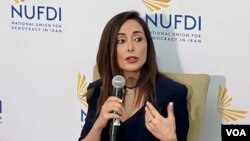The only European Union lawmaker of Iranian origin who lived in Iran until adulthood says EU foreign ministers are working to resolve obstacles to designating Tehran's Islamic Revolutionary Guard Corps as a terrorist organization.
The 27-nation EU bloc has already had sanctions in place for years against Iran’s top military force and its senior personnel in response to their perceived malign activities. But the EU has stopped short of applying the terrorist designation to the IRGC — a step taken by the United States in 2019.
European members of parliament, or MEPs, overwhelmingly approved a resolution on January 19 urging the executive EU Council to add the IRGC to its terrorist list. MEPs cited Iran’s violent crackdown on peaceful nationwide protests that erupted in September against the nation’s Islamist rulers and Tehran’s provision of drones to Russia for its war on Ukraine.
But EU foreign policy chief Josep Borrell told reporters on January 23 that such a step cannot be taken without a court of some EU member state issuing a “legal statement” on the matter. “Then we can work at the European level, but it has to be first a court decision,” he said.
German MEP Hannah Neumann tweeted in January that any terrorist listing of the IRGC should be “legally waterproof.”
“Adding #IRGC on terror list and then having a court annul that decision would be the worst of all signals,” she wrote.
While there has been no EU court ruling on the IRGC’s status since January, Lithuanian Foreign Minister Gabrielius Landsbergis told U.S. news site Axios earlier this month that there was “a growing consensus” in the EU about a need for a terrorist designation of the IRGC. “There are practical and legal issues that need to be sorted out, but I think we might be getting there," he said.
Iran-born Belgian parliamentarian Darya Safai, who fled her native country for Belgium at age 25 to escape persecution, has been one of the EU’s most outspoken advocates for adding the IRGC to the EU terrorist list. She submitted a resolution to the Belgian parliament in January supporting such a move and told VOA that she expects the assembly’s foreign affairs committee to review it in the coming months.
Safai discussed the outlook for the campaign on VOA’s Flashpoint Iran program as she visited Washington to participate in a forum organized by National Union for Democracy in Iran.
The following transcript of her interview, recorded Monday, has been edited for length and clarity.
VOA: What can you tell us about the EU's latest efforts to designate the IRGC as a terrorist entity?
Belgian Member of Parliament Darya Safai: It’s very important for people to know that since the Iranian revolution inspired by the death of Mahsa Amini, we have been working on it. I even submitted a resolution to the Belgian parliament to support putting the IRGC on the terror list of Europe. And we made a huge manifestation of people — Iranian and European — in front of the European Parliament, to let them hear how important it is to put the IRGC on this terror list.
The importance is not only symbolic. The IRGC organized terror and supported proxy wars in the whole region and gave the financial possibility to those terrorist groups to fight against Europe and other Western countries. So, this is how we can weaken the Islamic republic’s ideology and regime, by putting the IRGC on the terror list, where it belongs.
VOA: There is a resolution that you proposed in the Belgian parliament. How does it advance this objective of achieving the designation?
Safai: Actually, a resolution should not have been necessary for this. But when a majority of the people ask the government to do something, even though it is not obligated, it should act in one form or another, because that is what democracy demands of them.
When a majority of the European Parliament approved of putting the IRGC on the terror list in Europe, and the parliamentary president spoke, she told the Iranian people: Listen, you are on the good side of the history, and we are with you, and we support you.
This is what I would like to hear from European politicians and the people who have power in Europe. They should recognize that the Iranian revolution is not only about the future of Iran, it will change the policy of the whole world toward peace, freedom and prosperity. This is important for European politicians to know.
VOA: EU foreign policy chief Josep Borrell said a few months ago that you need a court to rule on the status of the IRGC before the EU can do anything. How do you overcome that obstacle?
Safai: That is obviously just an excuse. There is no political will to make it happen on the part of Josep Borrell, at least. But I should emphasize that this is not what all of the ministers of foreign affairs in Europe are thinking. A lot of them support putting the IRGC on the terrorist list. They are discussing a problem and will find a solution for it. I am sure that if we continue to show them the right direction, they will follow.
VOA: Are you saying there doesn't have to be a legal ruling first?
Safai: It is not necessary. Like in the case of Russia, when an aggressor shows itself to be aggressive, it is not necessary for you to base your assessment of that on one or other ruling of a court.
I will guarantee you that this campaign is not finished. There is a lot of hope. There are lots of foreign ministers of countries who know how dangerous the IRGC and Islamic republic regime are for the whole world. And we will continue to fight for the victory of Iranian people.

